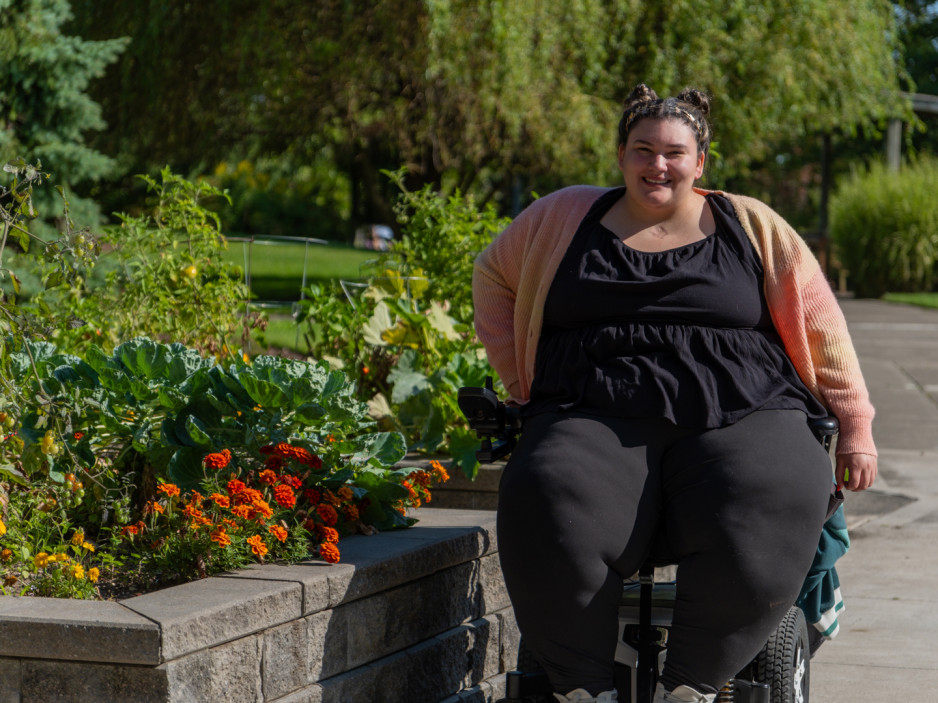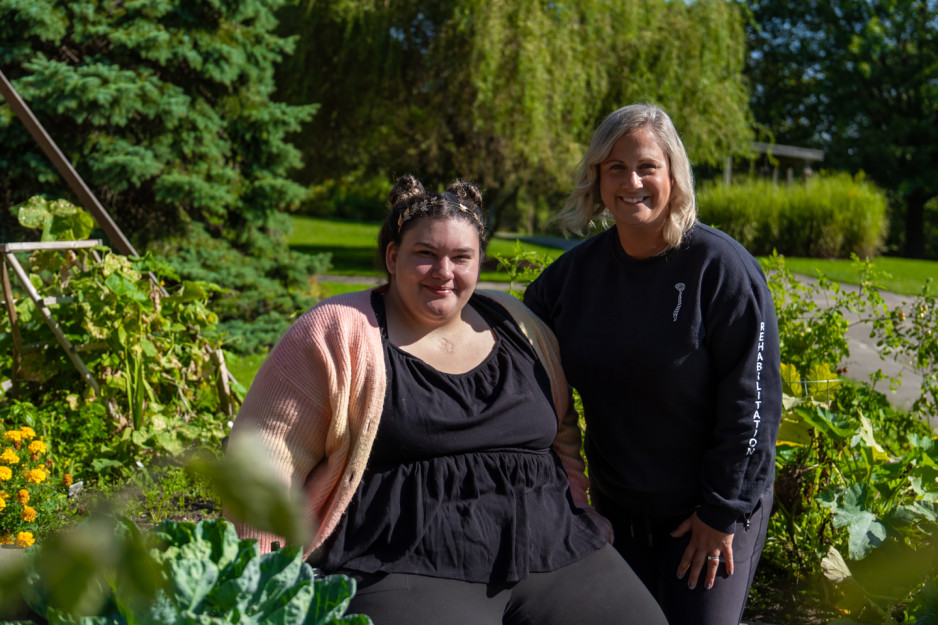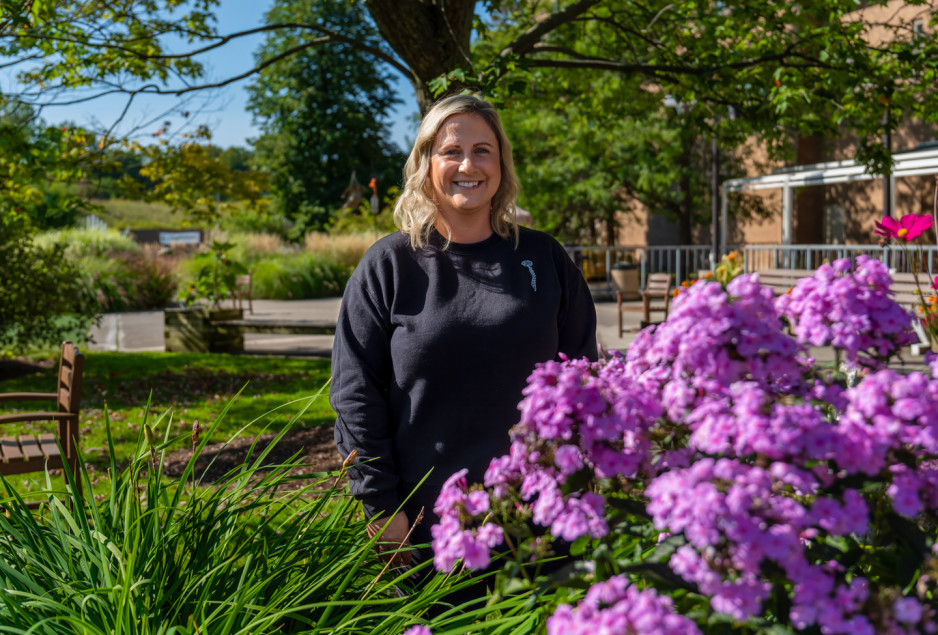Regaining life through leisure
When Elysa Spetgang was 21 years old, she had no idea the numbness and tingling in her feet would eventually lead to a medically induced coma and life support, a diagnosis of Guillain-Barre Syndrome and an eight-month stay at St. Joseph’s Health Care London’s Parkwood Institute.
For four months, Elysa Spetgang’s declining health was a medical mystery, until it reached a crisis point that left her on a ventilator and in a medically induced coma on life support.
Elysa had been routinely visiting the emergency department for on-going numbness and tingling in her lower body for months, with her symptoms continuously misdiagnosed. In October of 2021, she was admitted to an acute care department, and initially told her symptoms were in her head. It wasn’t until Elysa was found unresponsive that doctors realized how serious her condition was, and she was placed on a ventilator. The numbness she had been experiencing had travelled to her lungs – she was in respiratory failure and had to be put into a medically induced coma and on life support to minimize strain on her body. When Elysa was in a coma, her care team continued to search for the cause of her body’s quick decline. After completing a lumbar puncture – better known as a spinal tap – Elysa was diagnosed with Guillain–Barré syndrome – a rare disorder in which the immune system attacks the nerves causing rapid-onset muscle weakness, numbness and paralysis, usually ascending from lower limbs. Elysa specifically has acute motor axonal neuropathy, a rarer variant of Guillain-Barre Syndrome.
Five months after being diagnosed and recovering in acute care, Elysa was transferred to St. Joseph’s Health Care London (St. Joseph’s) where she would spend the next eight months on the neurological rehabilitation unit. When Elysa arrived at Parkwood Institute, her range of motion was very limited. The young woman, who had previously graduated the Doula Studies program at Fanshawe College and been enrolled in the Personal Support Worker program, was now unable to sit up in her hospital bed or lift her legs. While she had some use of her upper body, movements were very unsteady and weak, and she had difficulty even writing her name – a skill that had to be practiced over time.
“When I was transferred to Parkwood, I had just turned 22. It was really challenging and lonely to experience all of that at a young age, and there weren’t a lot of people around my age in the hospital,” says Elysa.
These feelings of loneliness pushed Elysa to find solace in her care journey – particularly, therapeutic recreation. “Recreational therapy meant so much to me,” says Elysa. “It got me away from my physical rehab and made me happy and excited.”
When speaking to Elysa, it’s clear there’s a passion and appreciation for the role therapeutic recreation played in her recovery. Whether it was spending time in the kitchen or going on outings to the mall, these activities made Elysa’s eventual return home “easier”.
Breanne Carr, a therapeutic recreation specialist in the rehabilitation programs at Parkwood Institute, worked with Elysa. “When Elysa first came to us, she was very young and it was scary for her to be paralyzed and not know what her future was going to be,” says Breanne. “Part of my job was to identify and assess what leisure activities brought her joy and improved her quality of life, so we could build those functional skills and she’d be able to pursue them independently again.”
Elysa is now 25 and participating in the aspects of life she loves – thanks to Breanne and recreational therapy. “It meant everything to me,” says Elysa. “Breanne would book the kitchen and we would cut the vegetables we grew in the garden and use them to bake things. I was able to practice using my hands again, and that helped me launch one of my businesses, London Sourdough. I sell at farmers markets now, and I was able to do that because getting back into the kitchen helped me use my hands again.”
The kitchen also helped Elysa in other ways. With such a rare diagnosis, Elysa’s mother researched foods to help with nerve regrowth and would bring these meals to the hospital. During her rehabilitation, the ‘little things’ fueled her to try a little harder.
Using her hands also helped her to garden again, a hobby Elysa enjoyed before her diagnosis. Now, she has raised garden beds at her home and loves working her hands through soil to decrease stress and anxiety.
As a talented ceramicist before her diagnosis, Elysa was terrified she wouldn’t be able to do pottery again living with Guillain-Barre Syndrome. When Breanne heard that, she connected with London Clay Art Centre, now Clayworx, and found it has an accessible pottery wheel that uses hand pedals instead of foot pedals. Slowly but surely, her love for pottery became another tool in her rehab, and Elysa began throwing one pound of clay, and then two, eventually progressing all the way up to ten pounds of clay. Now, Elysa sells pottery with her custom glaze colour and stamp.
“I love that Elysa is so motivated because she is proving to young survivors that you can do anything,” says Breanne. “She’s thriving in the community and it’s amazing that I played a part in helping her build her confidence just by getting her involved in activities and showing her she can still do the things she loves.”
-Breanne Carr, a therapeutic recreation specialist in the rehabilitation programs at Parkwood Institute
Throughout her rehabilitation, Elysa worked hard and witnessed the benefits of different therapies. And while recreational therapy was a meaningful outlet, it was the combination with physical therapy that helped her regain her ability to function.
After being discharged from inpatient care, Elysa continued outpatient physical therapy and continues to see the physical therapy team today. The rehabilitation she experienced has been lifechanging. With proper medication and care, Guillain–Barré syndrome will sometimes improve, descending in the opposite path it took when symptoms began. When Elysa began to regain feeling and use of her lower body, she was told she would need leg braces for the rest of her life due to ongoing ankle weakness. Through physical therapy, Elysa is now able to walk around her house with only a walker and doesn’t use braces at all anymore. This allowed her to begin using the foot pedal again for her pottery work – a skill she’s hopeful will allow her to one day drive again.
Elysa’s journey continues to defy the odds – with every uncertainty approached like a challenge to overcome. Now, with multiple successful businesses and starting a new post-secondary program – GIS and Urban Planning, a program she hopes will leverage her lived experience to make the world more accessible – Elysa has reshaped her life with the help of the care teams at St. Joseph’s.
“I love that Elysa is so motivated because she is proving to young survivors that you can do anything,” says Breanne. “She’s thriving in the community and it’s amazing that I played a part in helping her build her confidence just by getting her involved in activities and showing her she can still do the things she loves.”
Looking back to the beginning of her journey, Elysa’s advice to others in a similar situation would be to find a community. “If you’re nervous or feeling alone, reach out and become part of a community. Surround yourself with people you have fun with and resonate with, it’s so important to have people who have your back.”


